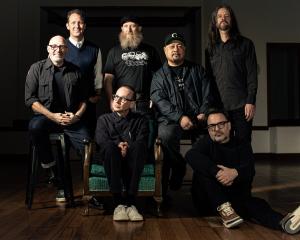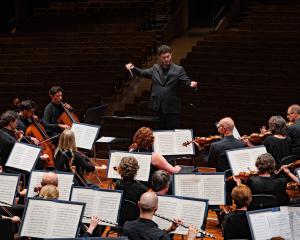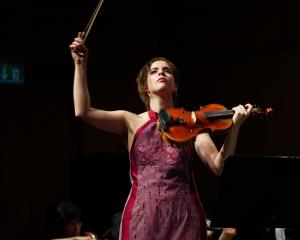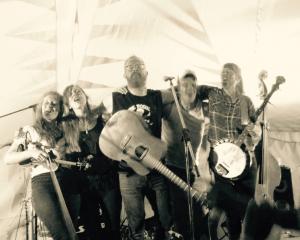History is being made as the New Zealand Symphony Orchestra shares the stage with the Rodger Fox Big Band. Rebecca Fox finds out how jazz and the classics come together.
Putting a symphony orchestra and jazz big band on one stage in New Zealand is ground-breaking but it does not worry Rodger Fox.
''There are new arrangements of popular songs plus a brand new work and we're taking them all around New Zealand. This has never been done to this level before.''
Conducted by New Zealander Hamish McKeich, the series will also feature United States trumpet virtuoso Allen Vizzutti.
Fox is excited about an idea that has been three years in the making.
''I didn't want it to be a 'pops' type concert.''
Instead he took his inspiration from American Woody Herman's big band concerts and the work of New Zealander Alan Broadbent, who was once Herman's arranger and pianist.
''They're the benchmark in how to integrate orchestras with big bands.''
Added to that is Fox's experience - the trombone player started his big band in 1973 and has gone on to be awarded an Officer of the New Zealand Order of Merit (ONZM) for services to music and receive an honorary doctorate of music from Massey University.
He also won Tuis for New Zealand Jazz Recording of the Year in 1981, 2000 and 2012.
His big band has recorded 36 albums, including live recordings at the Montreux Jazz Festival, the Vanguard Studio in New York and, most recently, an album at the famed Capitol recording studios in Los Angeles.
As well as keeping up his playing, Fox (63) is a senior lecturer at the New Zealand School of Music at Victoria University, where he looks after the large ensemble band programme.
With the New Zealand Symphony Orchestra on board, Fox began to source the music for what was to become a 12-centre tour Swing into Spring - touring 82 musicians from KeriKeri to Invercargill.
Internationally acclaimed composer and arranger Matt Harris was commissioned to write work for the concert.
Incorporating the contemporary sounds of bands like Snarky Puppy with the classic swinging big band sound of Fox's Big Band, The Red Zone is named after the area in Christchurch most affected by the February 2011 earthquake.
''This exciting new work takes the germ of an idea used in a Suite for Big Band and Orchestra composed some 40 years ago and puts it back into something contemporary, much like the rebuilding of the Red Zone area in Christchurch.''
Staying true to the Big Band tradition, Fox has taken two New Zealand classics and put a Big Band spin on them.
''Big Bands have always taken music that's current and put their own spin on it. They used to play The Beatles for instance ... performing Royals and Wandering Eye is our way of keeping that legacy going, as well as giving this great music another lease of life.''
New arrangements of New Zealand pop songs Royals (made famous by Grammy Award winner Lorde) and Wandering Eye (Fat Freddy's Drop) were created to be performed alongside jazz standards A Night in Tunisia (Dizzy Gillespie) and Take the A Train (Billy Strayhorn) as well as the Suite from Bernstein's West Side Story and Copland's Fanfare for the Common Man.
The inclusion of pop songs was a great way to give a more modern focus to the concerts, he said.
''People will arrive at the concert not knowing what to expect. I think it will capture the imagination with a programme that makes you want to see what happens when these two styles of music are put together.''
Stylistically it will be less challenging for Fox's big band to adjust to the programme, he says.
''They're all jazz pieces except for two pieces but the symphony orchestra is also used to playing many different genres - like the music for the Hobbit.
''They can adapt their style - its easier than you think.''
McKeich is also experienced at conducting orchestras playing different styles of music.
''It's more like a jazz gig than a traditional classical concert.
''The order of works will be decided spontaneously on the night depending on the mood in the concert hall.''
Vizzutti was called on to join the team because he regularly performed in both classical and jazz genres and was such a well-known name, he said.
''He's equally at home on the classic trumpet or standing up playing jazz. We are pleased he is able to come on board.''
The American has performed with a host of jazz greats including Doc Severinson and Chuck Magione.
He has also played on a wide variety of film scores and appeared with international orchestras including the NHK Symphony Orchestra in Tokyo and the Royal Philharmonic Orchestra in London.
Looking forward to his trip to New Zealand, Vizzutti describes the concert as being ''melodic, fun, jazzy and flashy, too''.
''There is no more colourful and magnificent musical palate than the symphony orchestra. In this concert we will have symphony and jazz band.''
He provided the music for his portion of the concert including Take the A Train, A Night In Tunisia and some of his own original melodic light jazz music.
Vizzutti (64), who still practises every day to maintain his world-class standard, says some of the performances which stand out for him include a solo performance when he was 14.
''[It] brought tears to my dad's eyes. He was in the front row.''
Others were his 1977 Warsaw Jazz Festival with the Woody Herman Band, recording his solo compositions on the Emerald Concerto and Other Gems classical CD with the Budapest Radio Orchestra and touring the world for three months with Chick Corea.
He also enjoyed recording movie soundtracks in Hollywood with John Williams, (1942 the movie), Jerry Goldsmith, (Star Trek), Bill Conti (Rocky 2, the Boss, Wife) and Henry Mancini (10, The Thorn Birds) to name just a few.
''Your performance must be nearly perfect and you must be flexible and compatible with others, always prepared and able to sight-read anything.''
He also has a passion for music education and its role in society.
''Music makes life worth living. It truly is food for the soul.
''I have travelled the world performing for sure. I have also taught globally doing clinics, master classes, residencies, festivals. I continue to write educational books for trumpet and other instruments to help the learning and performance growth process move forward and be fun.''
Vizzutti's advice for young trumpet players - ''Practise daily. Take lessons. Buy new books and solo musical material. Breathe in a voluminous way. Blow steady and smooth air. Make a beautiful sound.''
To see
Swing into Spring Dunedin Town Hall, tonight.
















